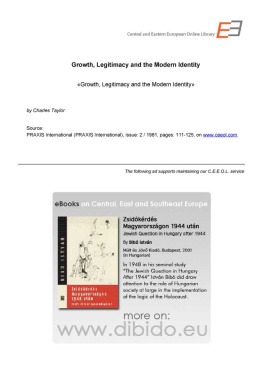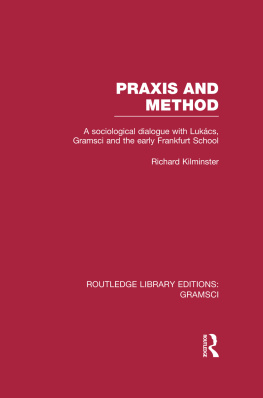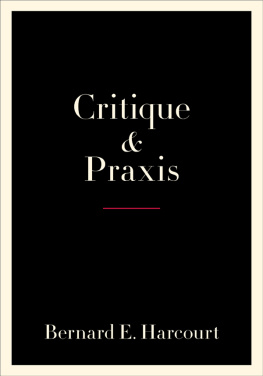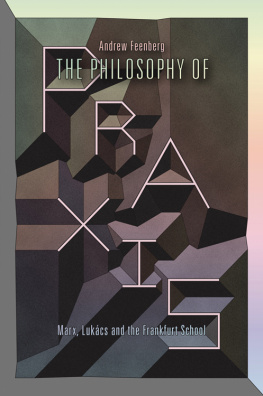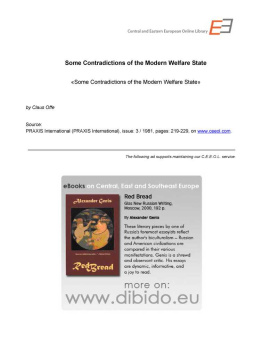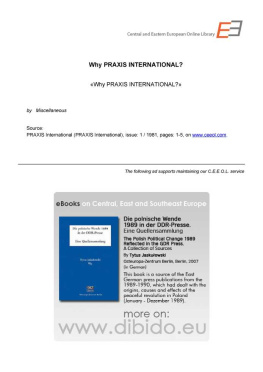GROWTH, LEGITIMACY AND THE MODERN
IDENTITY
Charles Taylor
Is capitalist society destroying itself? This question is of more than theoretical interest for socialists, not just because our answer might help to define a strategy of change. But even more so, because the strains of the present society help to make clear what kinds of transformation are possible and hence the shape of a possible future socialism.
The belief that capitalism destroys itself is, of course, central to the Marxist tradition. Capital adumbrates a number of ways in which the system careens towards breakdown owing to the uncontrolled nature of capitalist accumulation. Later this vision is refined, modified, even abandoned by some. We have had revised theories: that the system tends to increasing arms-production, or imperialism, or both; that it tends to export its contradictions to the international sphere. More recently we have theories like that of James OConnor1 which see capitalist economies as generating external costs that they cannot assume and which must be assumed by the political system, thus threatening the latters legitimacy.
I think this latter type of theory is approaching a theoretically fruitful area in which we can identify something like contradictions in modern advanced capitalist society.2 But I think we can only make headway if we focus our attention on the question of legitimation. The breakdown or self-undermining of capitalism cannot be adequately understood, I want to claim, if we think of it primarily in economic terms: as a failure of output or an escalation of costs. Rather, societies destroy themselves when they violate the conditions of legitimacy which they themselves tend to posit and inculcate.
What we need to get clearer, therefore, is the family of conceptions of the good life, the notions of what it is to be human, which have grown up with modern society and have framed the identity of contemporary people. This set of conceptions, of course, is linked essentially to the economic and political structures which have developed in the last centuries, although the link is not the simple one assumed by vulgar Marxism. But it is only by articulating these conceptions that we can identify the conditions of a legitimation crisis of contemporary society. For these will define the terms in which institutions, practices, disciplines, and structures will be recognized as legitimate or marked out as illegitimate.
I thus shall try, in the first part of this paper, to sketch an all-too-schematic portrait of the main lines of development of what I call the modern identity, to proceed in what follows to trace the features of modern society that reflect and entrench it, and to trace the ways in which this same society may be systematically undermining its own legitimacy.
0260-8448
Praxis International 1:2 July 1981
I think there are a family of conceptions of human beings, of freedom, and of human nature which emerge roughly in the seventeenth century and which have been woven into our developing commercial and later industrial capitalist society. It is this family that I want to refer to collectively as the modern identity. I want also to single out two phases in its development, both of which continue to exert a strong influence in our time.
(1) One of the key notions of the first phase was the new conceptions of freedom which emerged in the seventeenth century. This period saw a progressive rejection of world views in which humans were seen as forming part of some cosmic order, where their nature was to be understood by their relation to that order. Both the new conceptions of science and the new notion of autonomy pointed to a view of humans as beings who discover their purposes in themselves. Nature becomes internalized in the modern period. On this view, the free subject becomes someone who follows an internal purpose and who owes no a priori allegiance to a pre-existing order but only to structures that one has created by ones consent. Even the ancient conceptions of the freedom of the citizen,, which were essentially defined as a certain relation to a whole - the polis or republic - go into eclipse; and we find atomist conceptions of freedom developing where persons are seen to enjoy natural liberty in a state of nature.
(2) Along with this notion of freedom comes a new conception of what human nature demands. Traditional moral views grounded on nature, which descend from the ancients, offer what we might call a two-tiered view of the good life. This consists primarily in some higher activity distinct from the fulfillment of ordinary needs involved with the production and reproduction of life. Meeting these ordinary needs was of course unavoidable and good but was simply infrastructural to a distinct activity that gave life its higher significance. On one version this was defined as contemplation; on another influential version, the life of the citizen. On either version, lives which lacked the favored activity, and were entirely absorbed in meeting life-needs, were truncated and deprived. It followed that, outside of very exceptional social contexts, the fullness of human life was only for the few.
To some extent Christianity worked against these aristocratic conceptions, but the Christian church too developed a notion of an exceptional vocation, higher than that of the ordinary person, which was associated with celibacy. One of the central tenets of the Reformation was the rejection of this notion of the special vocation, and the preaching of a vision of ordinary life as hallowed. Following in this line there arises a secularized version of this in the seventeenth century. The demands of nature, of the new internalized nature, just are the ordinary needs of life. There is no higher stratum of activity. Rather, what defines proper human activity is a certain manner of going about meeting these needs: in a sober, disciplined, clairvoyant, and rational way. This last term, rationality, could be taken to sum up the properly human way of living. But it now, of course, changes its sense. It is less and less defined in terms of a vision of the true order of things and is more and more defined in terms of instrumental reason. The rational pursuit of the needs of life crucially includes our seeking them in an effective manner.
The ethic which rejects a class-distinction in purposes and activities is also antiaristocratic in social thrust. The norm of rational pursuit of ordinary life-needs is, in a sense, the bourgeois ethic. An example of the remarkable penetration of this ethos into our whole civilization is the development of the modern notion of the family. From the seventeenth century on, in the higher classes of Anglo-Saxon societies, and spreading outward and downward from these, we find a new outlook in which the companionate marriage and the life of the nuclear family come more and more to be seen as one of the central fulfillments of human life. This has become so much a part of our contemporary world that we find it hard to imagine a time when it was not so. But it is relatively recent in human history. The modern need for privacy is part of this same development, as is the growing emphasis on sentiment. One of the ways of understanding modern consumer society is as an attempt to make available for the vast majority the conditions of self-enclosed family life as this ideal has developed in the past three centuries.3 A second facet of this outlook has been the extraordinary development of forms of mass discipline - the regimenting of gesture and action to produce maximum effect - which begins in the eighteenth century in armies, schools, prisons, factories, and so on. This has been interestingly traced by Michel Foucault in his Surveiller et Punir.4
(3) In connection with this last phenomenon, we can see a third leading notion developing in this period which I will call efficacy. The free individual meeting the demands of nature in the modern sense must aspire to a higher degree of control over himself and over nature. Exercising the control that enables one to effect ones purposes more fully and to a higher degree is a mark of rationality, i.e. one is pursuing ones life-needs in a properly human way.

